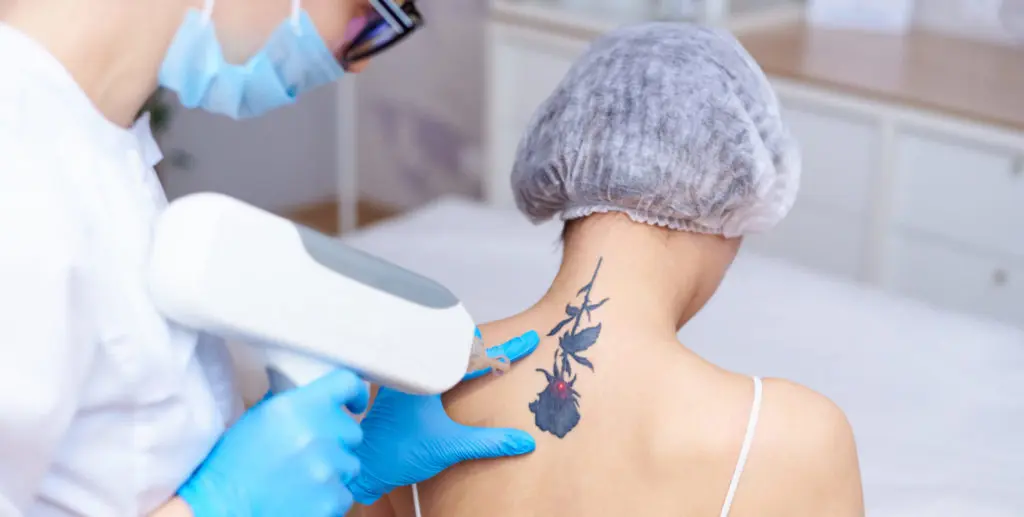Frequently asked questions
How do I know if tattoo removal is suitable for me?
Laser tattoo removal may not be suitable for you if you have a dark skin tone; this is due to the potential of the treatment leaving a ‘ghosting’ effect, where the skin is left lighter than the surrounding area. During your consultation, our tattoo experts will assess your tattoo and determine which solution is most appropriate for you. In some cases, the most appropriate form of removal for a tattoo could be excision. This involves having the tattoo surgically removed using a scalpel, with a local anaesthetic applied. Although more invasive, it can sometimes be the most effective solution and may also be quicker.
What’s the difference between laser tattoo removal and other methods?
Other tattoo removal methods do not involve lasers. We do not recommend the following methods of tattoo removal because they can cause scarring and have a high risk of infection. Tattoo removal creams – these work by dissolving the tattoo using chemicals such as hydroquinone, kojic acid, alpha arbutin and TCA. They cannot completely remove a tattoo, but may reduce its appearance in some cases. Dermabrasion tattoo removal – this involves using an abrasive device to blast the surface of the skin in order to break down the tattoo and remove the top layers of skin. A local anaesthetic is usually administered as this is a painful method of removal. Salabrasion – this works in a similar way to dermabrasion but involves applying water and salt in addition to an abrasive device in order to lift and remove layers of skin. Acid tattoo removal – some people are now using acids, similar to those used in chemical skin peels, to burn away layers of the skin in order to get rid of their tattoos. Many health professionals strongly advise against this method.
Is tattoo removal safe?
Yes, it’s very safe. The laser energy is selectively absorbed by the tattoo ink only, meaning that surrounding tissues are not affected and there is no lasting damage to the skin. At sk:n, we operate within the strictest safety and medical protocols, so you can trust you’re in the safest hands at sk:n.
Is tattoo removal painful?
Laser tattoo removal can cause a stinging sensation but most people do not experience high level of discomfort during the treatment. Local anaesthetic cream can be used and/or pain relief, such as paracetamol. Redness in the area is common after the procedure, but subsides quickly. The skin will be sensitive after your treatment so we recommend high-factor sun block. A combination of skin care products will be recommended to you after the treatment. You may experience a lightening or darkening of the affected skin, though in most cases this returns to normal after six months.
How long will it take to remove my tattoo?
A course of 6-10 treatments is often enough to remove the tattoo depending on the colour and depth of the tattoo ink. To allow the skin to recover between Laser Tattoo Removal sessions, you can only have treatment every 6-12 weeks. We’ve also got access to the latest Pico Lasers in select clinics if you want even quicker results.
I’ve had my tattoo done recently. Is it easier to remove?
The ink particles of the tattoo will have been injected deep into the dermis (the second layer of skin). In order to reverse this process effectively, the pigment within the skin needs to be broken down using targeted lasers. Don’t be fooled into believing that if you have a change of heart shortly after getting your tattoo it can be easily removed.
I want to fade my tattoo so I can have a new design. How many treatments will I need?
A tattoo can be faded adequately to re-cover after a couple of sessions. Your practitioner will be able to advise how many sessions you are likely to need during your consultation.
Tattoo removal methods at home
At-home tattoo removal methods are generally not recommended as they carry a higher risk of infection and complications.
There are a number of tattoo removal creams available to buy online. These are usually administered without the advice of a medical practitioner, so they can lead to serious complications. Burning, swelling, itching, scabbing, discolouration, infection and permanent scarring are some of the most common side effects of using tattoo removal creams.
Although tattoo removal creams might be appropriate for some tattoos, they are not necessarily the safest removal option. Therefore, professional advice should be sought before using.
Dermabrasion involves using an abrasive device to blast the surface of the skin in order to break down the tattoo and remove the top layers of skin. A local anaesthetic is usually administered as this is a painful method of removal.
Salabrasion works in a similar way to dermabrasion, but involves applying water and salt in addition to an abrasive device in order to lift and remove layers of skin.

Tattoo removal at sk:n
Having a tattoo removed is not a quick process and takes a lot of time and investment.
Be careful when choosing a provider for this treatment; always ensure it is being carried out by a regulated clinic or practitioner, in a safe, sterile environment.
Cheaper alternatives might seem like a good deal at the time, but could result in infection or scarring.
At sk:n, professional laser tattoo removal starts at £164 for a four-treatment course.
Request a callback
One of our friendly sk:n advisors will call you to book your consultation.
- More than 450 consultants, doctors, nurses and medical practitioners
- Regulated by the Care Quality Commission, Health Inspectorate Wales and Health Improvement Scotland
- Partner of the NHS
- Rated excellent by our clients on Trustpilot
- Strict safety and care protocols


